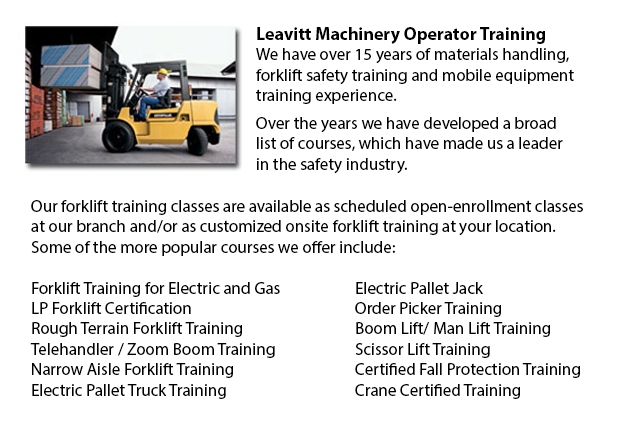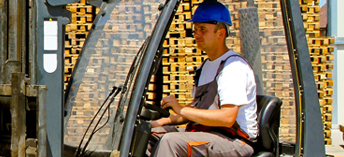
Oshawa Forklift Training Classes - Forklift are heavy pieces of industrial machines that are used in transporting and the handling of materials and merchandise. They are commonly called Lift trucks and are found in all sorts of industries. Workers working with and around forklifts have to be trained to spot dangers related with the utilization of forklifts.
We offer forklift training classes in order to teach our trainees how to safely make use of a lift truck. The theory segment of the course will cover instruction and classes on becoming a lift truck operator. Trainees will learn their legal responsibilities as lift truck operators. Upon finishing the classes, a printed certificate will be given. The certificate needs to be signed by somebody authorized to verify that a hands-on evaluation has been completed in the workplace of the trainee.
Forklift Safety
Forklift trucks are vital in industrial workplaces for their ability to transport and lift heavy loads. Lift trucks are indispensable to many industrial worksites, but forklifts can be dangerous without correctly training employees. Forklift injuries, when they happen, tend to be serious due to the power of these heavy equipment. Personnel who work frequently around lift trucks can become complacent and forget about the dangers. Important operating and maintenance measures can be neglected.
Forklift training is required not just for new employees. Periodic re-training is important for all operators. First aid training is likewise vital.
Daily inspection procedures are of critical importance. Forklifts could become damaged if they are not inspected regularly. Prior to being used, lift trucks need to be visually inspected as to their general condition. An operational check should be done to be able to determine the equipment is correctly working. The supervisor should be alerted if anything is noted that could impact the safe utilization of the forklift.
An inspection determines if the place is clear of things which could pose a danger. Whichever overhead obstructions must be noted. Check that a functioning fire extinguisher is accessible. Different levels must be inspected, like fuel, radiator water, engine oil, and electrolyte levels in cells. Battery, cables and plug should be inspected. Unclog vent caps and ensure that nuts, bolts, chains, guards, and hydraulic hose reels are not damaged, missing or loose. A tire check would make sure that wheels are not damaged or worn. Pneumatic tires would require a pressure check.
-
Oshawa Scissor Lift Operator Certification
Oshawa Scissor Lift Operator Certification - North American regulators recommend that worksites need operators of scissor lifts, booms or aerial work platforms to obtain certification training. Scissor lift operator certification is not mandatory, bu... More -
Narrow Aisle Forklift / Order Picker Training / Electric Pallet Jack / Electric Pallet Truck Training in Oshawa
A pallet lift is a model of equipment dedicated in the moving of pallets of many dimensions and weights. They might be utilized as an appendage for platform lifts, cranes and other types of heavy machinery or be applied on their own. Pallet hoists ar... More -
Oshawa Crane Operator Certification
Oshawa Crane Operator Certification - The process to permit people to be able to operate certain kinds of cranes is to take crane operator certification training to get certification. The certification process incorporates classroom learning, hands-o... More -
Oshawa Aerial Platform Training
Oshawa Aerial Platform Training - Aerial platform lifts might be utilized to accomplish a lot of unique tasks executed in hard to reach aerial places. A few of the odd jobs associated with this style of lift include performing routine repair on build... More -
Oshawa Forklift Certification Schools
Oshawa Forklift Certification Schools - Forklift Certification is mandatory within North America. Hence, forklift training programs are important both for companies and for people seeking jobs in industries as forklift operators. Forklift training fo... More -
Oshawa Heavy Equipment Ticket
Oshawa Heavy Equipment Ticket - Depending on the nature of the job at hand, the type of construction equipment that a heavy equipment operator makes use of varies. Each and every type of machine is built to perform specific jobs in the most effective... More -
Oshawa Heavy Equipment Certification
Oshawa Heavy Equipment Certification - Large pieces of machines and heavy-duty vehicles are usually known as heavy equipment. This broad term includes utility vehicles from forestry and agricultural implements to civil engineering vehicles, construct... More -
Oshawa Overhead Crane Safety Training
Oshawa Overhead Crane Safety Training - The overhead crane safety training program is meant to equip the operators with the right skills and knowledge in the areas of: crane safety precautions, accident avoidance, materials handling, and equipment an... More

Forklift Certification Oshawa
TOLL FREE: 1-888-254-6157
Oshawa, Ontario
forkliftcertificationoshawa.com
Email Us
About Us


